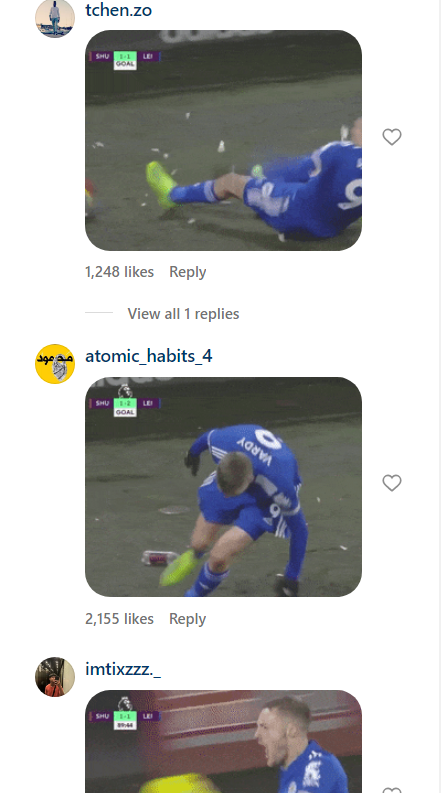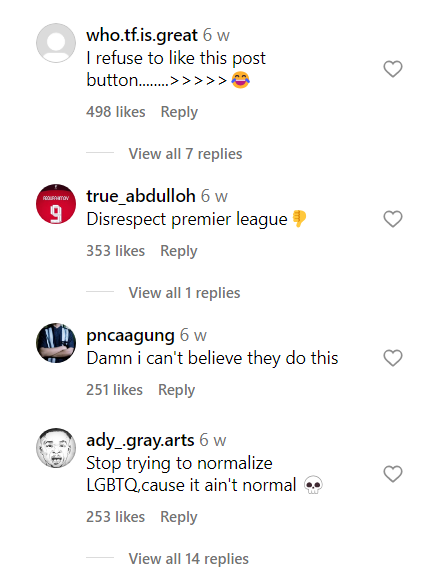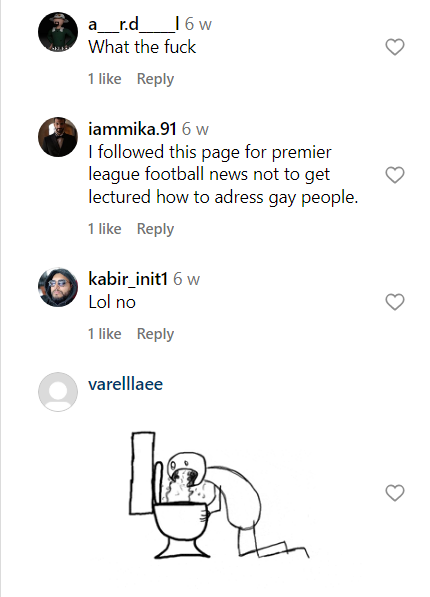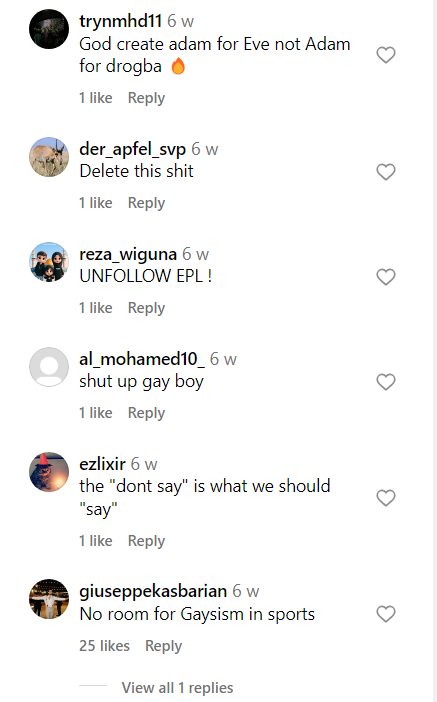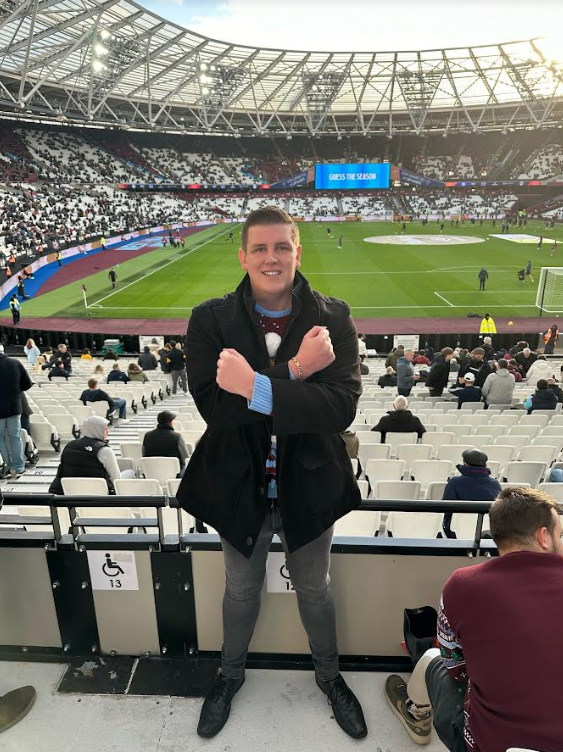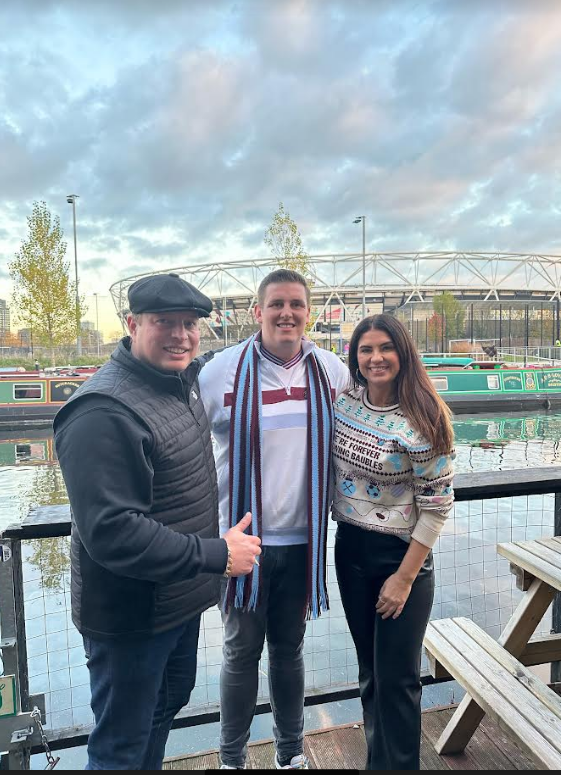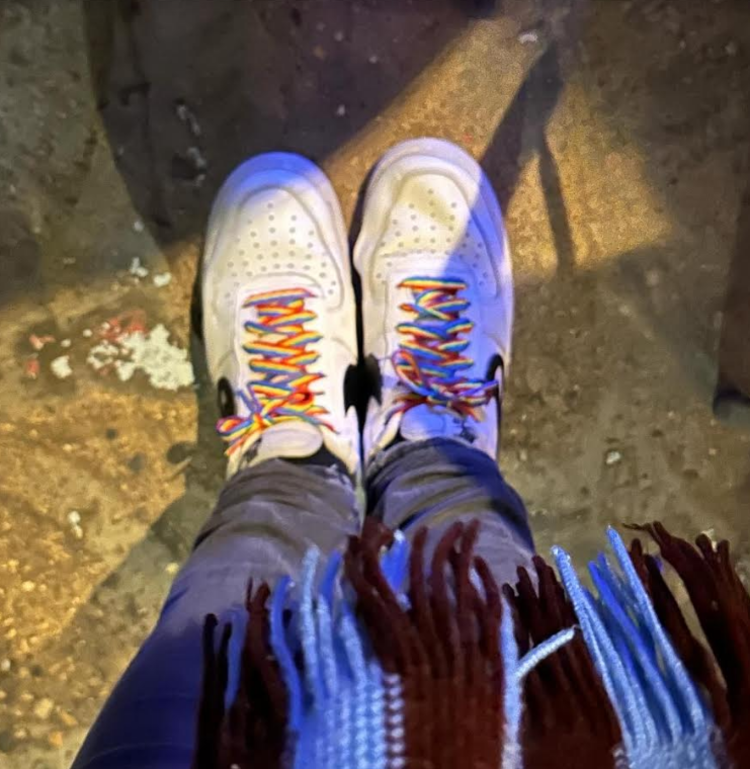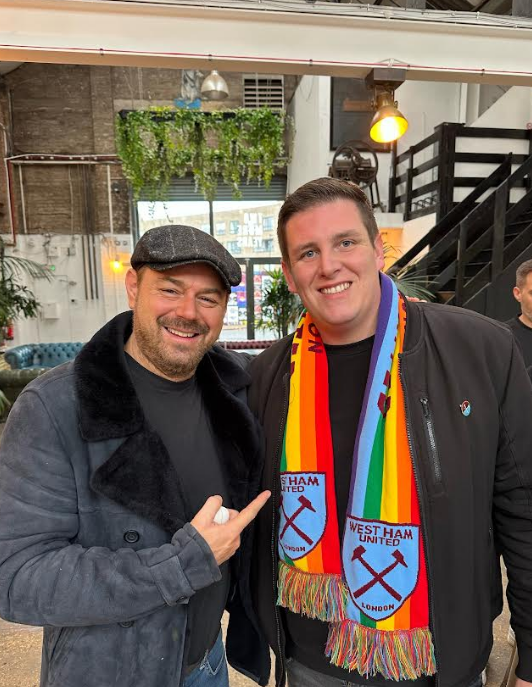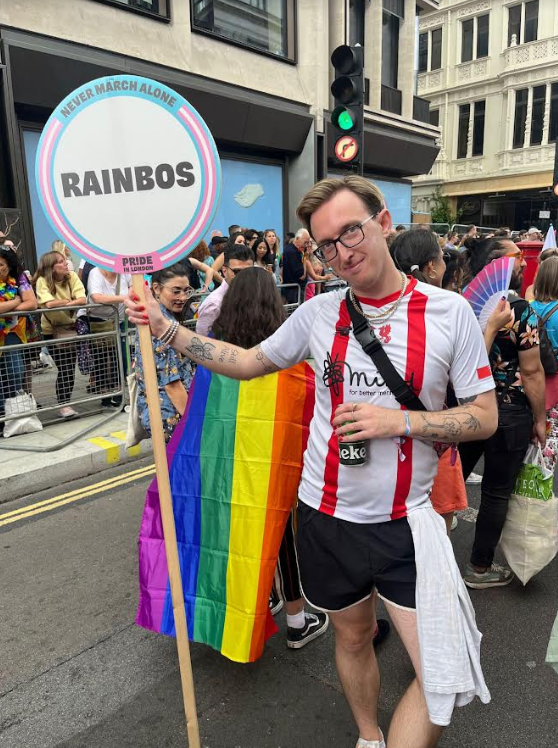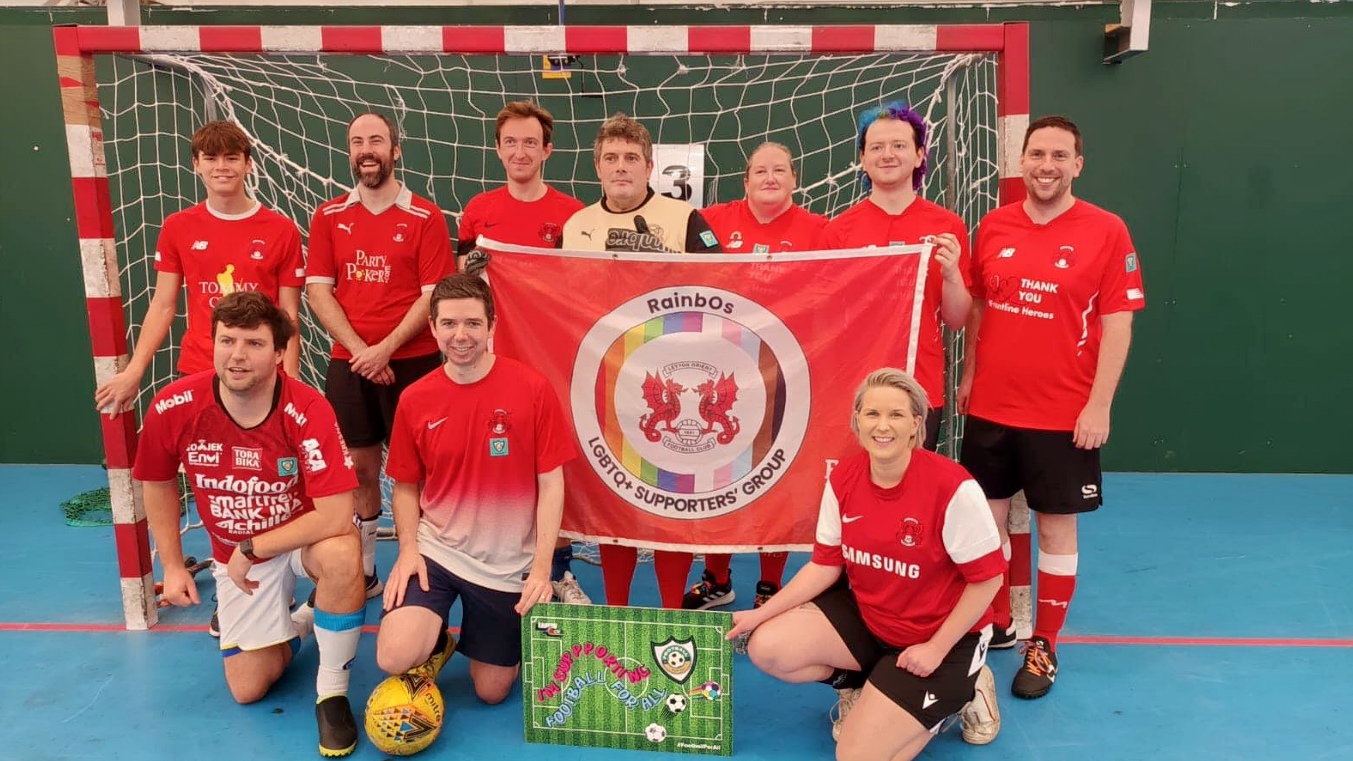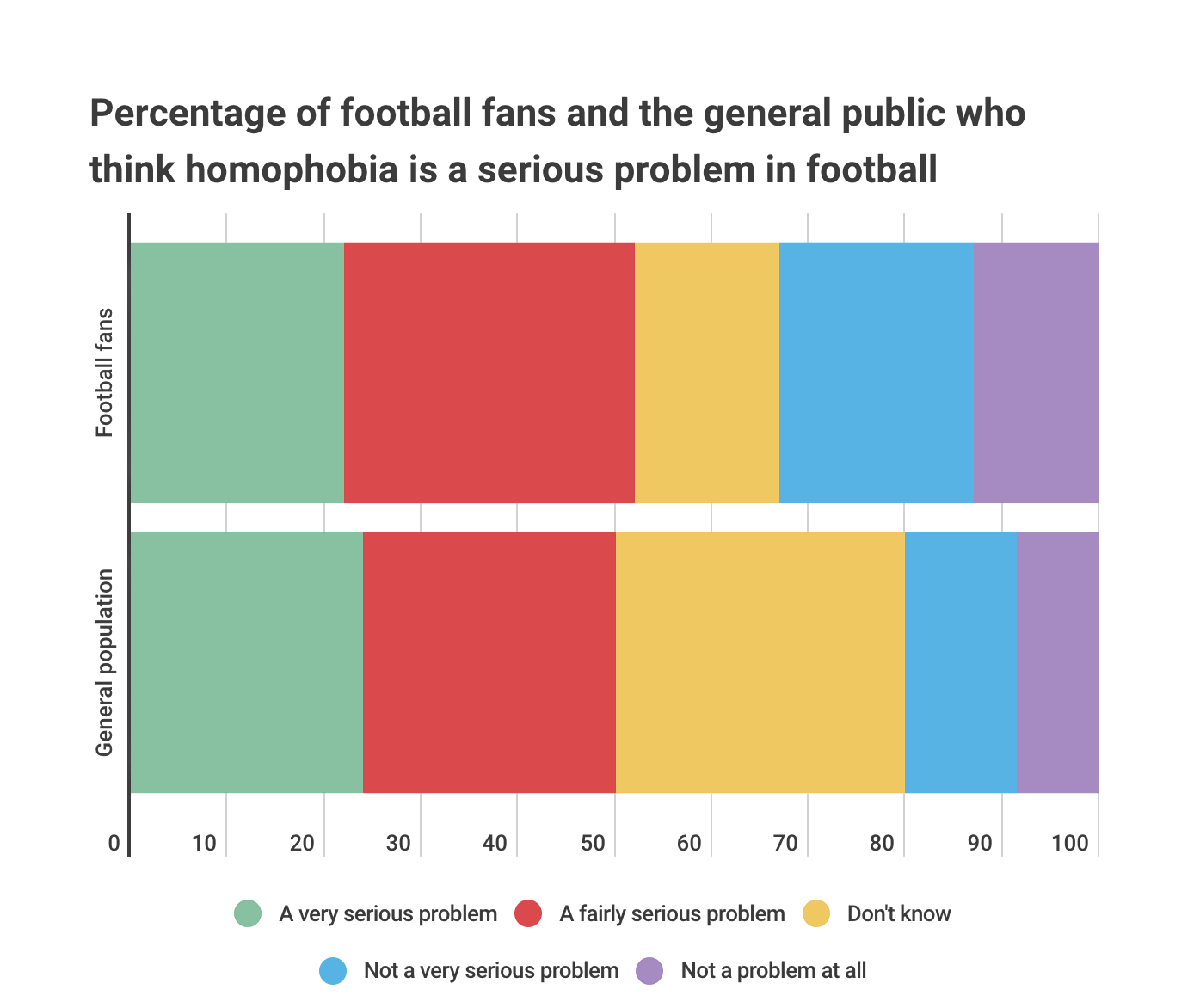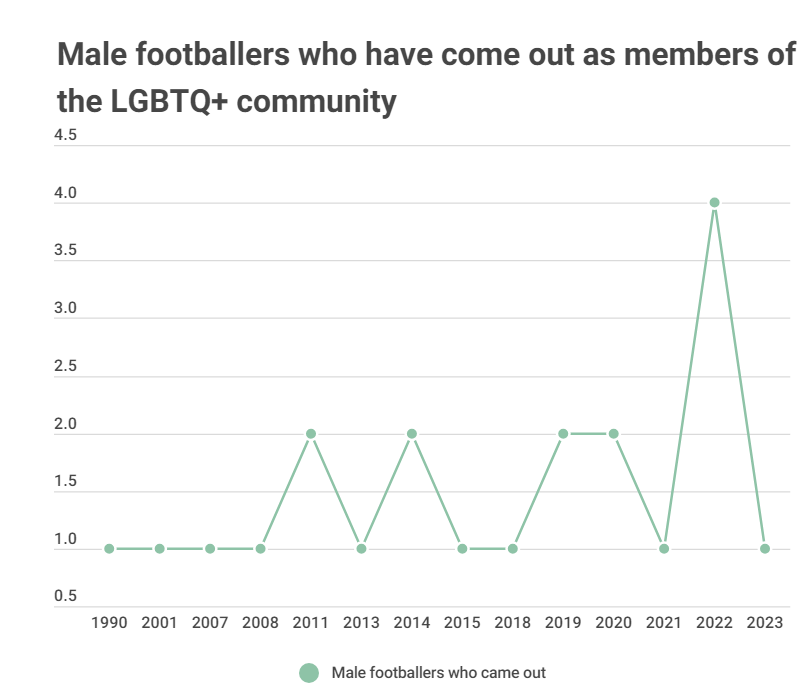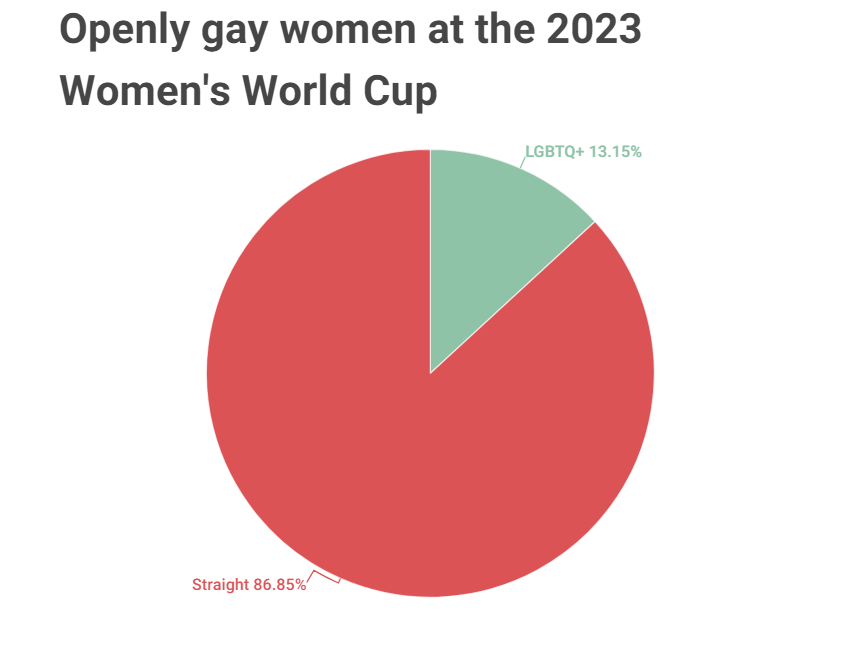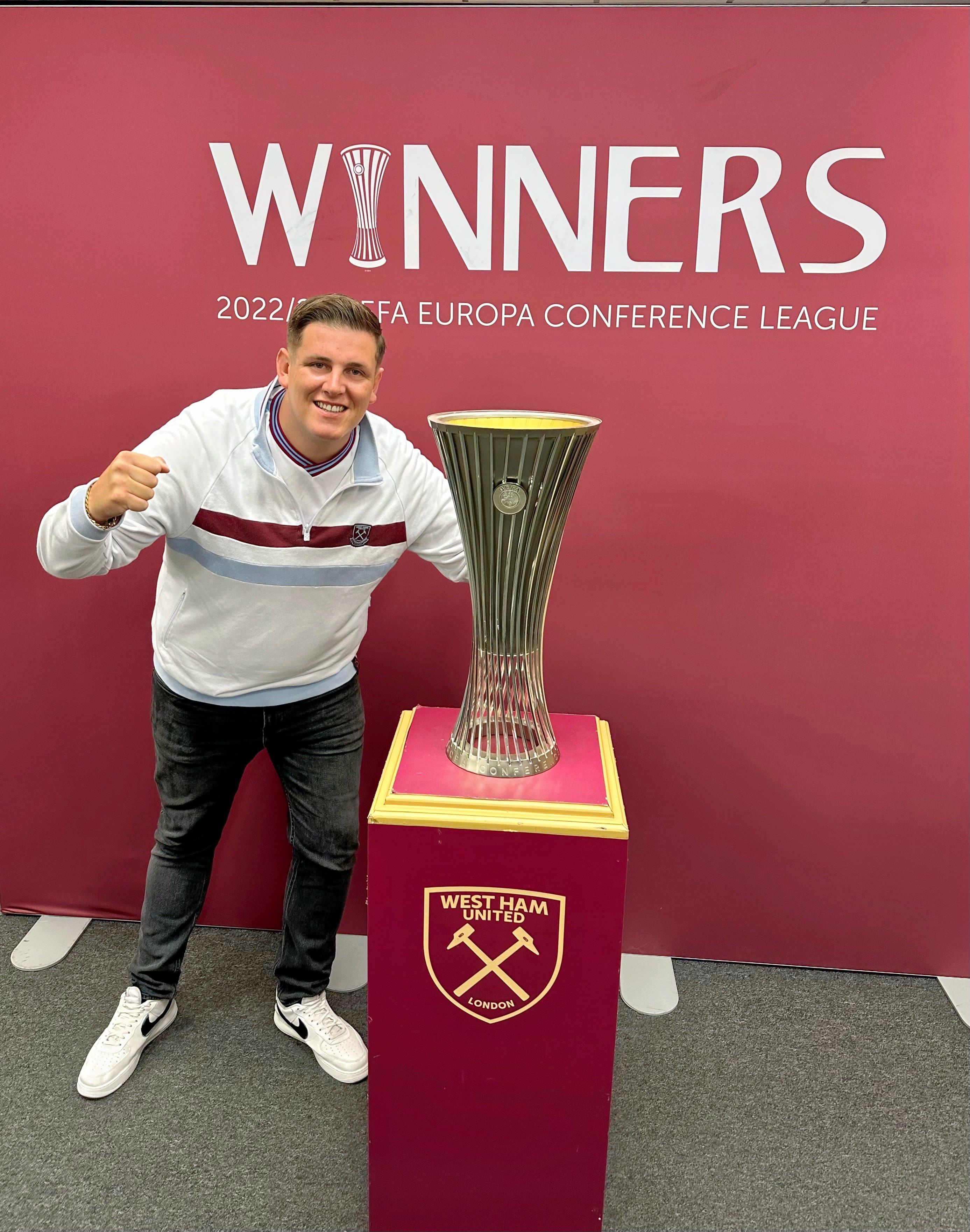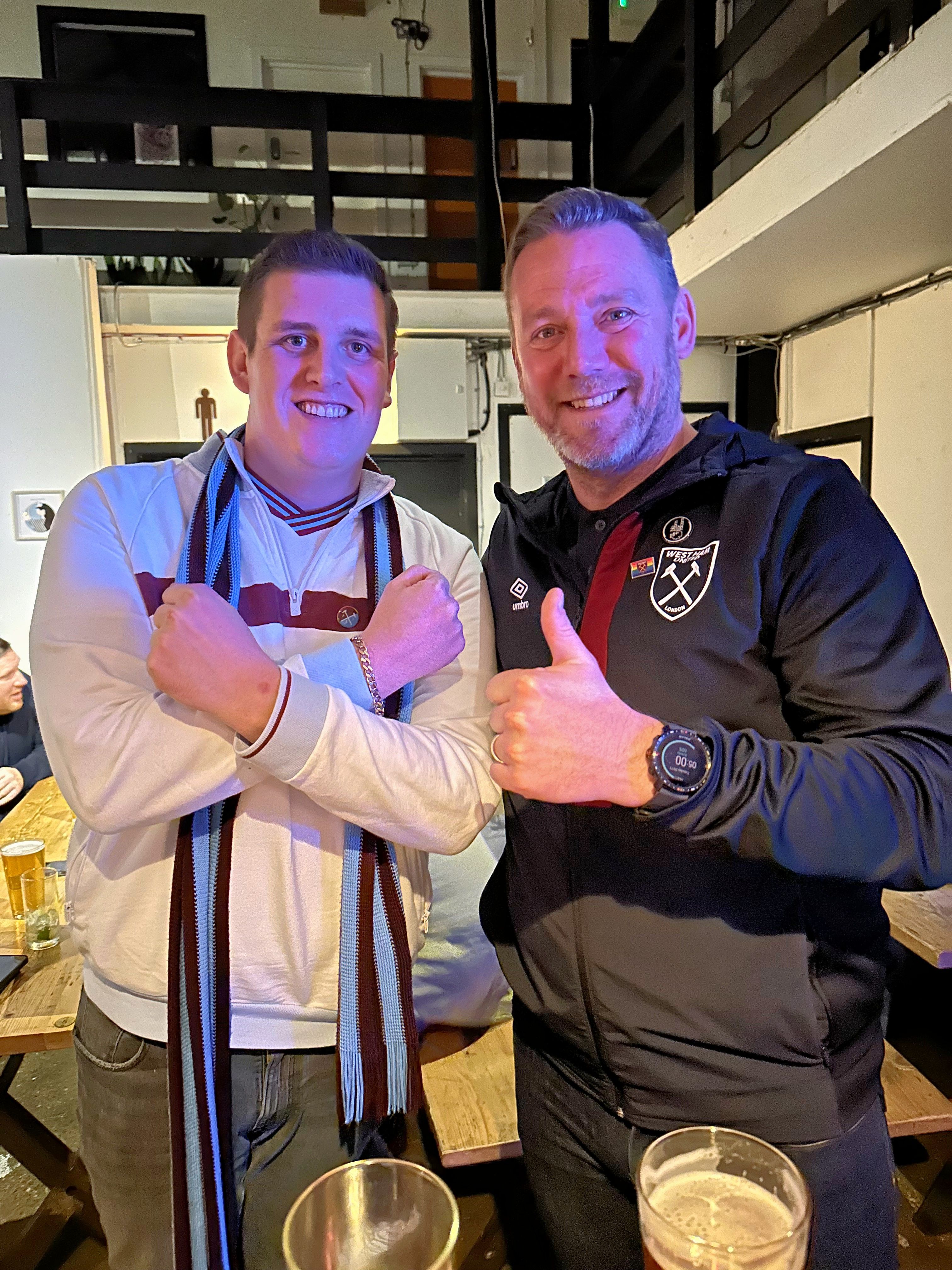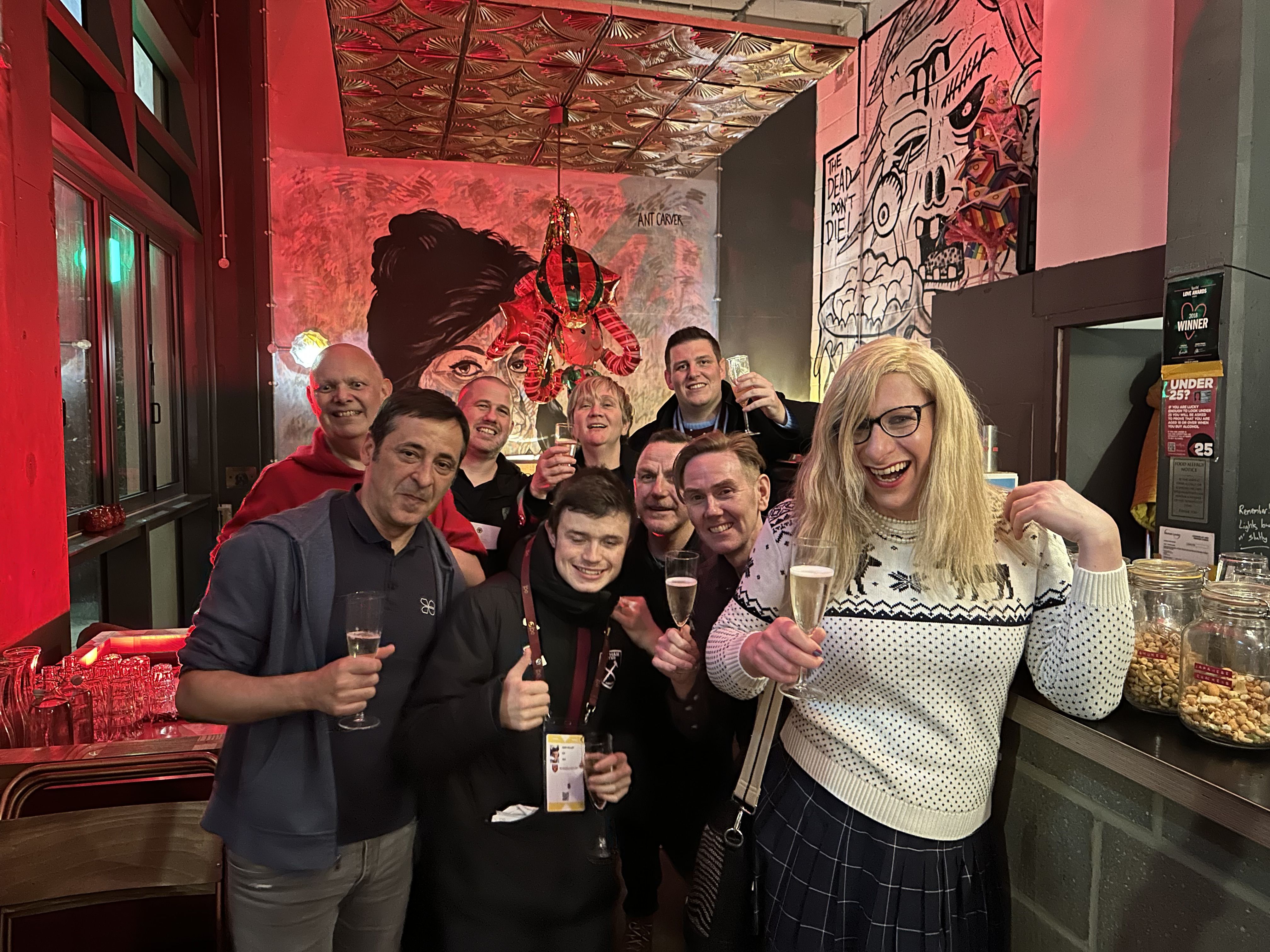"Some guy wished I died of aids"
Being an LGBTQ+ football fan: a taboo topic
How fans deal with abuse in their 'safe space'
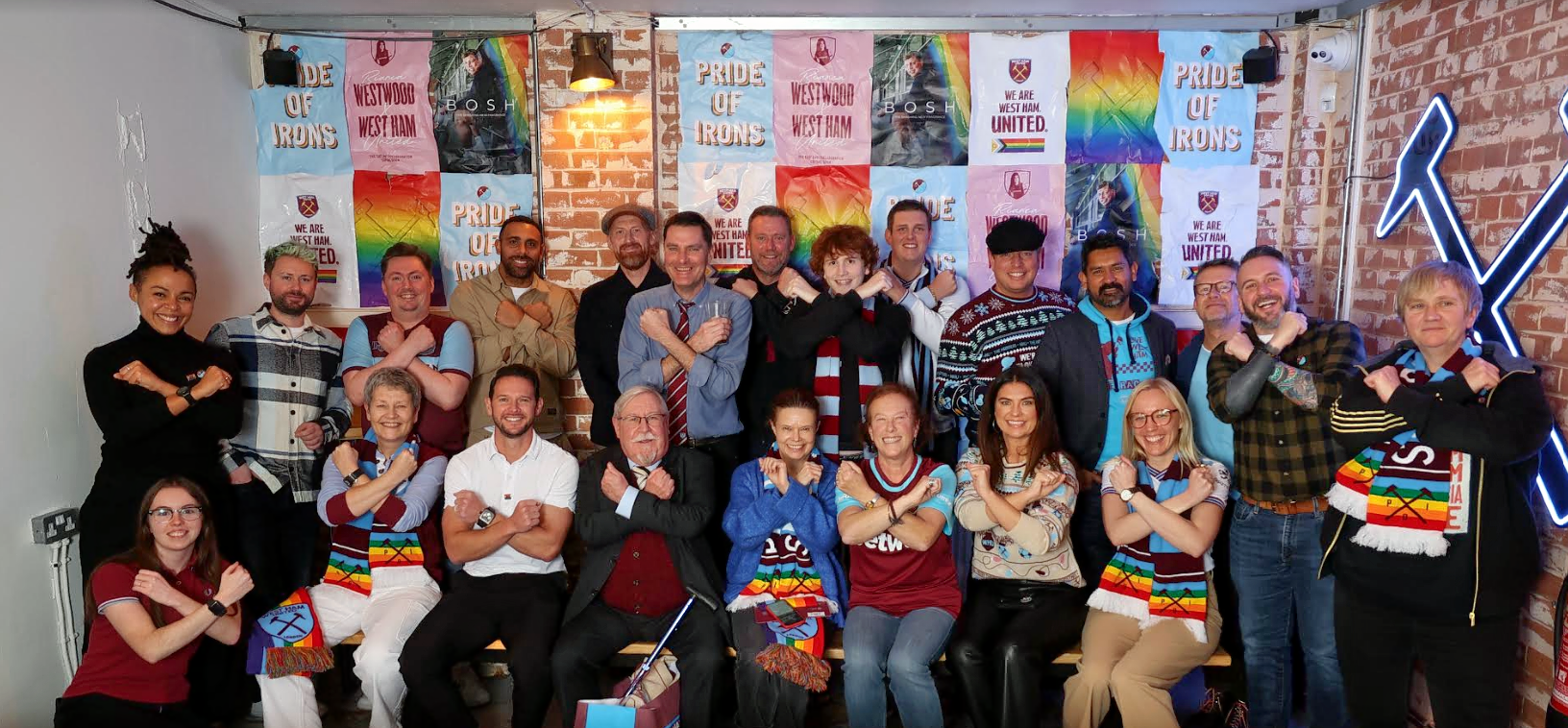
"Because to be gay is to feel that men's football is not welcoming" - Adam Crofton
Football for many is a safe space where fans can go and watch their team play and forget all of their troubles. Many fans go to matches to take their mind off their personal life.
Yet for members of the LGBTQ+ community, it is a place where they can't forget their troubles because they get attacked and ridiculed at games.
Over the past 10 years, many organisations have tried to promote inclusivity in the sport. Stonewalls Rainbow Laces has been running for over 10 years and is at the forefront for LGBTQ+ fans at football games.
They give out free rainbow laces to premier league footballers who can choose to wear them. So far over one million people have laced up their boots in rainbow colours.
Despite this, homophobia stays rampant in football.
The Premier League has been at the forefront of promoting inclusivity for the LGBTQ+ at football. It was Stonewall Rainbow Lace's 10th anniversary. The comments they received on the post were shocking and filled with hate.
The majority of the comments featured Leicester striker Jamie Vardy sliding into the corner flag before kicking it and sending the flag splintering across the corner of the pitch. As this match was held in December of 2020, the flag on top of the pole was a rainbow one.
Vardy immediately apologised to the LGBTQ+ community and even wrote a heartfelt message on the flag which he gifted to Leicester's LGBTQ+ fan group, Foxes Pride.
However the damage had been done and as soon as the match finished, Vardy's celebration was turned into a gif and spread across all corners of the internet.
Vardy was heralded as a 'saint' for driving down members of the LGBTQ+ community, even if this wasn't his goal.
Since Vardy's celebration went viral, it has often been the response to any posts about the LGBTQ+ community underneath football posts.
Other comments on the post tended to spread severe hate to the LGBTQ+ community.
Comments such as "Stop trying to normalise LGBTQ, cause it ain't normal" and 'I'm betting 1k that you're either diagnosed with autism or some other mental disease.
It's always the weirdos who feel the need to protect LGBTQ' received hundreds of likes supporting the homophobic comments."
Comments like this are why gay men are scared to come out in football.
Ex-professional football Thomas Berling came out in 2001, aged just 21 years old. He had disappeared from football the year before and nobody knew why.
After coming out, it came out that he had retired from football because of 'the widespread homophobia in the football community.'
He had only played for two years and had been capped by the Norway under-19 side twice. His career was ruined because of homophobic fans.
Since Justin Fashanu came out in 1990, making him the first-ever openly gay footballer, only 20 more male footballers have come out as members of the LGBTQ+.
Most footballers who are gay don't come out until after their retirement. They do this so they don't receive hate from the footballing community.
In women's football, it is near the polar opposite. Currently, 56 women footballers are openly members of the LGBTQ+ community in the women's Super League.
Across the world, there are even more players such as Brazilian international Marta who has won the FIFA Player of the Year award six times and is regarded as one of the best women's footballers ever.
Once again, on the polarising side, men's football has had only one player ever to come out as gay while being an active international player.
Jakub Jankto of the Czech Republic came out as gay on the 13th of February 2023 and remains the only active men's international player to do so
Screenshot taken from the Premier League's Instagram account
Screenshot taken from the Premier League's Instagram account
Screenshot taken from the Premier League's Instagram account
Screenshot taken from the Premier League's Instagram account
Screenshot taken from the Premier League's Instagram account
Screenshot taken from the Premier League's Instagram account
Screenshot taken from the Premier League's Instagram account
Screenshot taken from the Premier League's Instagram account
Joshua Dodd is a member of Pride of Irons, an LGBTQ+ group for fans of West Ham
I got the chance to sit down with him and discuss his experiences as an openly gay football fan
"If I had a friend who was gay and a professional football player in the premier league and they asked me if I should come out as gay, I would worry for them."
The state of how the LGBTQ+ community is treated in football at this current time is shocking.
Homophobia is rampant and it is no surprise that many professional footballers do not want to come out. Ex-professional player turned pundit Gary Linekar said in October 2022 that he knew two Premier League players who were close to coming out before and that
"It would be great if one or two of them came out during the World Cup."
Neither of the players that Gary Lineker mentioned came out, but that was to no one's surprise. Coming out whilst being a professional player could ultimately mean the end of their career.
"I posted a photo with a celebrity who came down to support the Rainbow Laces campaign and 99% of the interactions on the post were supportive.
But one person decided to retweet it with the caption that the fact I'd worn an LGBTQ+ scarf with this celebrity means I should be punished with death."
These sorts of comments are why even normal people struggle to come out as gay. It isn't just hate they receive in real life, they receive it online as well.
The argument against this is that people should just turn their phone off if they are being abused online, but why should they? They have every right to post about whatever they want.
"I think times might be changing. I have seen us play Brighton many times which is a city that is very positive with the LGBTQ+ community and every year you hear homophobic chants against them.
But when West Ham played Brighton recently, I didn't hear any of these chants."
Brighton aren't the only team to face homophobic chants against them. One of the most prevalent chants in football is the 'Chelsea rent boy' chant which is sung at practically every Chelsea game.
It may only seem like a small insignificant joke, but these comments can hurt people.
Joshua at a West Ham game. Courtesy of Joshua Dodd
Joshua at a West Ham game. Courtesy of Joshua Dodd
Celebrities are known to help out at LGBTQ+ events as they draw attention to the cause. One of these players was Jordan Henderson.
Henderson was one of the biggest allies for the LGBTQ+ community as he would constantly get involved with pride activities and defend members of the LGBTQ+ on Twitter.
Henderson's reputation was tarnished however when he decided to make his big money move to Saudi Arabia.
In an interview with David Ornstein and Adam Crofton, Henderson said: "I had to make the decision on what was best for me and my family. So, the football is the football side."
"So, do I go somewhere to try something new, to grow the game that I love in another country, and grow the league into one of the best in the world?"
"That excites me because I want to grow the sport all over the world. And that got me going, really."
Henderson added that he was going to "keep his values" and "having someone in Saudi Arabia with those views and values is a good thing."
However, the damage was done, and the interview came across as very fake and almost like a cop-out. The comments on the post ripped into him for his answers where Ornstein and Crofton grilled him.
Just six months after Henderson's move to Saudi Arabia, he transferred to Dutch club Ajax. Signifying how poor the transfer really was.
Joshua Dodd with internet sensation Tom Skinner. Courtesy of Joshua Dodd
Joshua Dodd with internet sensation Tom Skinner. Courtesy of Joshua Dodd
An example of Rainbow laces. Courtesy of Joshua Dodd
An example of Rainbow laces. Courtesy of Joshua Dodd
Joshua with actor and West Ham fan, Danny Dyer. Courtesy of Joshua Dodd
Joshua with actor and West Ham fan, Danny Dyer. Courtesy of Joshua Dodd
Josh talking about ant LGBTQ+ chants at football matches. Courtesy of Joe Ryan
Josh talking about ant LGBTQ+ chants at football matches. Courtesy of Joe Ryan
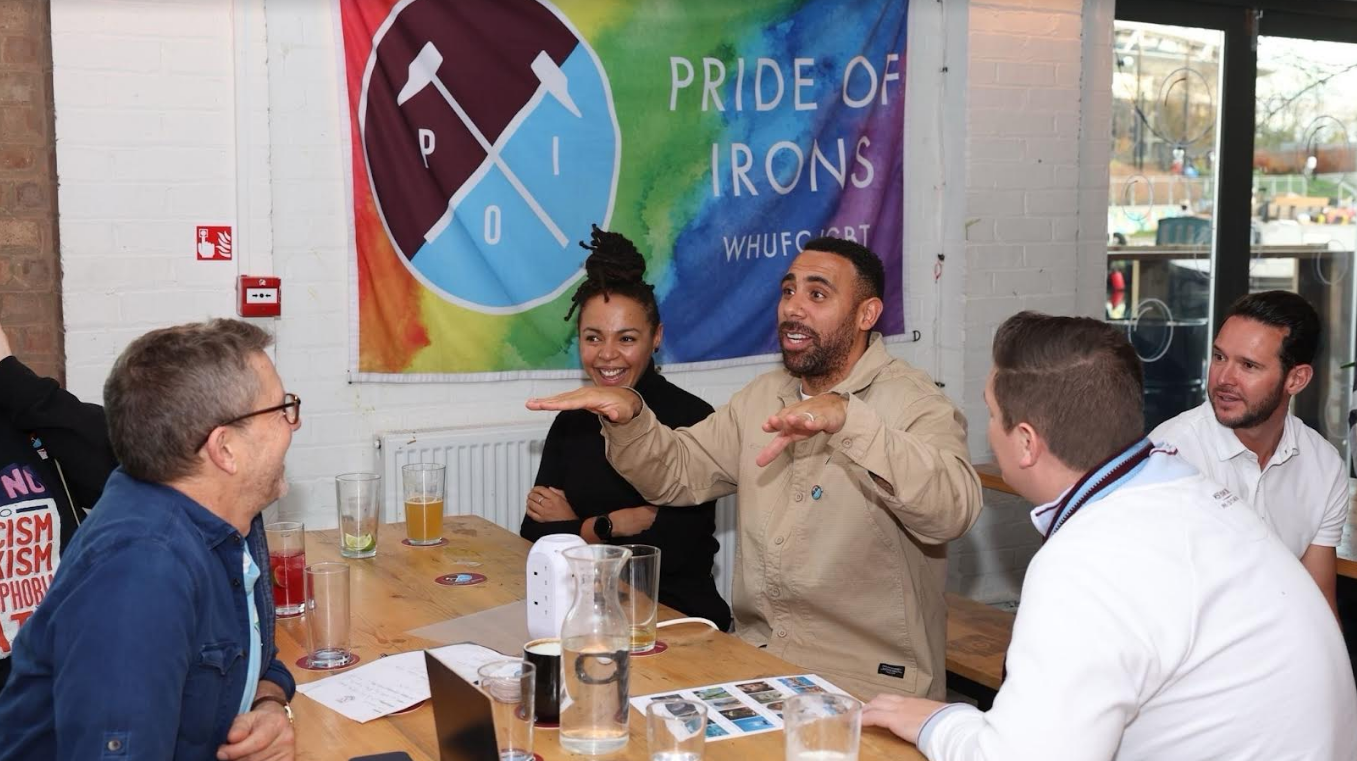
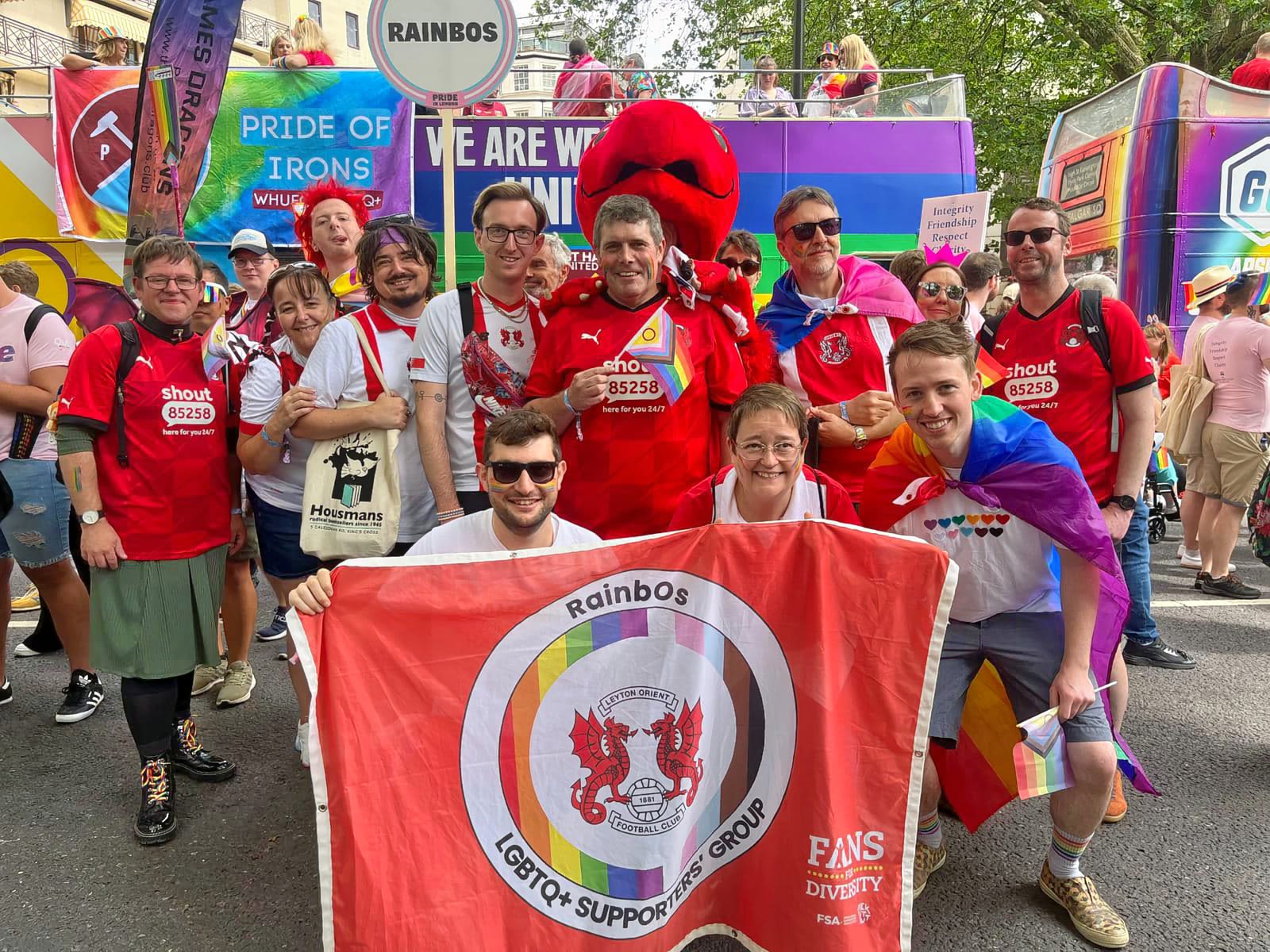
Pride of Irons is an LGBTQ+ community group for fans of West Ham football club. They were founded in 2015
Rainbos Leyton Orient is an LGBTQ+ community group for fans of Leyton Orient. They were formed just over a year ago in October of 2022.
Chris Knight talking about the abuse he has faced online. Courtesy of Joe Ryan
Chris Knight talking about the abuse he has faced online. Courtesy of Joe Ryan
Chris at the London 2023 Gay pride event. Courtesy of Chris Knight
Chris at the London 2023 Gay pride event. Courtesy of Chris Knight
Rainbos Leyton Orient football team. Courtesy of Chris Knight
Rainbos Leyton Orient football team. Courtesy of Chris Knight
A graph showing what percentage of football fans and the general public think that homophobia is a serious issue in football.
A graph showing what percentage of football fans and the general public think that homophobia is a serious issue in football.
A graph of very year when a male footballer has come out as a member of the LGBTQ+ community.
A graph of very year when a male footballer has come out as a member of the LGBTQ+ community.
Female footballers who were openly gay at the 2023 World Cup. At least 96 of the 730 women who competed were part of the LGBTQ+ community.
Female footballers who were openly gay at the 2023 World Cup. At least 96 of the 730 women who competed were part of the LGBTQ+ community.
Joshua with the conference league trophy. Courtesy of Joshua Dobb
Joshua with the conference league trophy. Courtesy of Joshua Dobb
Chris Knight is a member of Rainbos Leyton Orient. He talked me through his experiences as a gay man
"There are always messages on Instagram, some guy wished I died of aids"
This is the sort of abuse that members of the LGBTQ+ community have to deal with on a day-to-day basis.
Football is meant to be their safe space, yet they are constantly attacked and ridiculed for their sexual choices.
When Chris talked about the 2022 World Cup he said: "It is difficult to feel let down when you have no expectation."
"The 2022 one hurt though"
This was the voice echoed by the LGBTQ+ community. Millions of gay football fans across the globe felt hurt by FIFA's decision to host the World Cup in a country where it is illegal to be gay.
However, what Chris wanted from the 2022 World Cup was 'representation of gay people. The 2022 World Cup didn't really affect me, I couldn't go to it anyway."
There was lots of LGBTQ+ representation at the 2022 World Cup, but the Qatari state scrutinised nearly all of it.
One of the first incidents was when Laura McAllister, a former captain of the Welsh women's side, wore a rainbow bucket hat to Wale's opening game against the United States of America.
It sparked massive debate and controversy.
When I spoke to her last year she said: "it is important to know this is a FIFA World Cup in Qatar, let's be clear about that"
"The rules and regulations of FIFA need to be the framework of how the tournament operates"
"Fifa tell us this is a World Cup for everyone, where the whole world is welcome.
"Clearly that is not true."
Many other incidents sparked outrage amongst the LGBTQ+ community regarding the 2022 World Cup.
One of them was banning the One Love armband, a multicoloured armband that promotes inclusivity and sends a message to all types of discrimination in the sport.
After the World Cup had started, FIFA announced to the seven teams that planned on wearing the armband that captains would either be shown a yellow card or even possibly banned if they went ahead with wearing the armband.
One of the biggest issues Chris has had to deal with whilst being a member of the LGBTQ+ community is feeling "disillusioned" with the Leyton Orient fanbase.
Although Chris is the treasurer for Rainbos Leyton Orient, he first noticed LGBTQ+ discrimination in the 2018/19 season.
He said: "There were several incidents of homophobia from Orient fans, and I didn't feel part of the community anymore."
"I stopped going to games for a couple of years but then Rainbos got set up and I got loads of messages from people that I should get involved."
Chris told me that: "One of the reasons it is so easy to ignore gay people is because it isn't obvious. Unless people are actively coming out, I think it's something people pretend doesn't exist."
"Where you had big advancement in things like racism and sexism, you can't with the LGBTQ+ community because you can hide being gay."
Sexism, racism and homophobia are at the forefront of taboo subjects in football. Whilst these taboo topics have decreased in abuse, they are still prevelant in football.
Homophobia is one of the hardest to combat as to make yourself a target, you have to be openly gay.
Josh also made comments on this when he said: "People have in their head the stereotype of what gay people should be."
"And that's wrong because not everyone is going to fit that stereotype."
Joshua Dobb speaking about the Qatar World Cup. Courtesy of Joe Ryan
Joshua Dobb speaking about the Qatar World Cup. Courtesy of Joe Ryan
What can clubs and organisations do to help?
In the UK, 52 clubs are now part of Pride in football, an organisation that helps clubs set up LGBTQ+ groups and support them.
Some of the clubs that are on here include: Manchester United, Rainbow Devils, Manchester City, Canal Street Blues, Liverpool, Kop outs, Arsenal, GayGooners, Chelsea, Chelsea Pride, Tottenham Hotspur, Proud LilyWhites, and even the England national team has an LGBTQ+ supporters' group.
Both Josh and Chris agreed that for the LGBTQ+ community to feel safe and included in football, straight people need to step up at times.
At matches where LGBTQ+ fans may be getting verbally or even physically abused, other fans have to stand up for LGBTQ+ fans.
Chris said: "It's not my job to tell straight people not to be abusive to me or other gay people. We have to live our lives in fear, we don't want to then go to the football which should be our release to then feel alienated."
Chris added: "95% of fans are civil to us. I've even had people come up to me and say we're so happy you exist, but you still need to call people out. If your friend makes a homophobic comment, tell them that they're being a prick."
Another aspect Josh and Chris agreed on was education. If a fan makes a negative comment on the LGBTQ+ community, don't ban them from the game.
If you ban fans from games because of their comments, they won't take it out on the club.
Fans have a deep-rooted passion for their club, they don't have a deep-rooted passion for the LGBTQ+ community.
You ban them from games, and it is just more likely they will take it out on the gay community.
If you offer education to people, it is much less likely that people will abuse the LGBTQ+ community.
Having education at school is imperative to this success because it teaches children from a young age to respect everyone.
Josh with West Ham assistant manager Kevin Nolan. Courtesy of Joshua Dobb
Josh with West Ham assistant manager Kevin Nolan. Courtesy of Joshua Dobb
Members of Pride of Irons at their Christmas party. Courtesy of Joshua Dobb.
Members of Pride of Irons at their Christmas party. Courtesy of Joshua Dobb.
Joshua speaking about what clubs can do to help the LGBTQ+ community. Courtesy of Joe Ryan
Joshua speaking about what clubs can do to help the LGBTQ+ community. Courtesy of Joe Ryan
Members of the LGBTQ+ community have to live in fear every day. In 66 different countries across the world, they criminalise LGBTQ+ people in some form.
People who are gay in these countries have to wake up every day not knowing if today could be their last.
At any second they could be outed for their sexual belief.
Even in countries that allow members of the LGBTQ+ to be open with their beliefs, they are still not safe.
It was only in 2006 that England had their first ever prosecution for a homophobic murder when Jody Dobrowski was murdered by two men who thought he was gay.
In 2012, Steven Simpson, an openly gay 18-year-old, had homophobic slurs written over his body and was set alight. Simpson died and his attacker was only given a three-and-a-half-year sentence.
All of this happened at his birthday party.
"Being gay to your teammates and your organization is very different from being gay publicly. When you travel you have a big target on your back for ridicule. I think that’s why athletes don’t come out. You put a target on your back"
"People probably guessed that I was gay because I’m pretty transparent in the way that I live my life. I think it’s pretty cool, the opportunity that I have, especially in sports, because there’s really not that many out athletes. I think it’s important to be out. It’s important to stand up and be counted and be proud of who you are. I’m happy if I can help anyone else in their struggle. I’d like to make a positive impact on people."
There are still so many improvements that need to happen to allow members of the LGBTQ+ community to be themselves.
Josh and Chris have both felt comfortable enough to come out in this society, but they have had support from their friends and family to help them.
Many people don't have friends and family to rely on when they find out they are gay.
Lots of people come from extreme right-wing backgrounds where they would be scared to tell their friends and family that they are gay.
Sadly, in lots of places across the world, this is the social norm.
It shouldn't be.
Chris talking about the incidents he has faced as a member of the LGBTQ+. Courtesy of Joe Ryan
Chris talking about the incidents he has faced as a member of the LGBTQ+. Courtesy of Joe Ryan
Change seems to be happening in England. Granted, it is changing slowly but at least there is some change happening.
But fans still get abused at games.
Organisations still allow major tournaments to be held in countries where it is illegal to be gay.
There are still many professional footballers who are too afraid to come out as gay because it could destroy their career.
Josh and Chris are just two of the millions of gay football fans across the globe. However, many gay fans live their life in fear every day of being exposed and the reaction will come with it.
Thousands of gay people are murdered every year because of their sexual choices.
